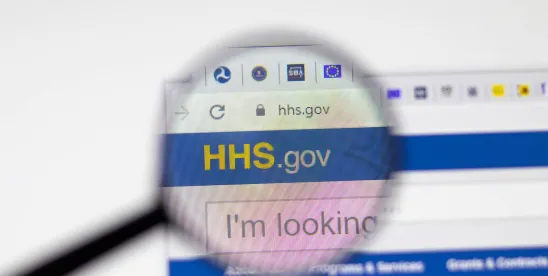A Notice published on July 14, 2025 identifies 12 new Federal public benefit programs (see list below) for which non-qualified aliens are not eligible. Although it was published by the U.S. Department of Health and Human Services (HHS) with immediate effect, the Notice invites the public to submit comments before August 13, 2025, which could lead to modifications of the agency’s interpretation.
The Notice may have a major impact on organizations and entities that participate in the identified programs and the communities they serve. Stakeholders evaluating the potential for these changes should be aware that significant questions remain unanswered.
The Notice aims to broaden the prohibition in the Personal Responsibility and Work Opportunity Reconciliation Act of 1996 (PRWORA) on a non-citizen who is not a “qualified alien” from accessing “any Federal public benefit.”1 Similar notices were also released by the U.S. Department of Labor (DOL), the U.S. Department of Education (DOE), the U.S. Department of Agriculture (USDA), and the U.S. Department of Justice (DOJ).
In general, a qualified alien is a non-citizen who has been lawfully admitted for permanent residence in the United States, or who meets certain other categories (asylees, refugees, etc.). Individuals lawfully present on a temporary basis are not considered qualified aliens. The Notice identifies 12 additional HHS programs as Federal public benefit programs that non-qualified aliens are not eligible for under PRWORA:
- Title X Family Planning Program;
- Head Start;
- Title IV-E Educational and Training Voucher Program;
- Community Services Block Grant (CSBG);
- Health Center Program;
- Substance Use Prevention, Treatment, and Recovery Services Block Grant;
- Community Mental Health Services Block Grant;
- Projects for Assistance in Transition from Homelessness Grant Program;
- Certified Community Behavioral Health Clinics;
- Mental Health and Substance Use Disorder Treatment, Prevention, and Recovery Support Services Programs administered by the Substance Abuse and Mental Health Services Administration;
- Title IV-E Prevention Services Program;
- Title IV-E Kinship Guardianship Assistance Program;
- Health Workforce Programs not otherwise covered under “Health Profession Education and Training Assistance,” as described above (including grants, loans, scholarships, payments, and loan repayments).
Courts Will Have the Final Word on the Scope of Federal Public Benefits and the Effect of PRWORA
The Notice articulates the HHS interpretation of “Federal public benefit” under PRWORA, but is not a regulation or law. The revised interpretation has already been challenged in court by a group of 21 states and the District of Columbia. Following the Supreme Court’s decision in Loper Bright, courts will interpret PRWORA without affording deference to agencies such as HHS, making it less clear whether the HHS change in position will have a significant influence on how the courts view the law.2
The legal interpretations set forth in the Notice take a broader view of what is a Federal public benefit, but also vary by program, which raises the possibility that courts could conclude that some, but not all, of the 12 newly-identified programs are subject to PRWORA. Because the Notice is primarily focused on the definition of “Federal public benefit,” it does not address most questions about the impact of identifying new Federal public benefit programs. We anticipate future litigation will address and clarify the reach of PRWORA.
The Scope of Newly Identified Federal Public Benefit Programs is Unclear
While the Notice sets forth its reasoning for why certain HHS programs are Federal public benefits, it does not address how this conclusion applies to particular programs. For example, the Notice indicates that the “Health Center Program” is a Federal public benefit, which likely refers to the federal grants provided to certain community health centers under section 330 of the Public Health Services Act. The Notice does not address whether HHS views the “Health Center Program” to also include entities that are approved as meeting the requirements for a section 330 grant, but do not receive a grant (i.e., “Federally qualified health center look-alikes”). Similarly, the Notice fails to address whether the inclusion of programs such as the Substance Use Prevention, Treatment, and Recovery Services Block Grant applies the PRWORA prohibition to the entity that receives the award or also to all subgrantees, contractors, and delegated entities.
Statutory Exemptions may Apply
Some programs that meet the revised HHS interpretation of “Federal public benefit” may also qualify for statutory exemptions under PRWORA. These exemptions are not discussed in the Notice but remain in place under the law. Stakeholders should review the law to identify all the applicable exemptions, which include (but are not limited to) the following:
- Limited scope Medicaid (emergency only);
- Public health assistance for immunizations with respect to immunizable diseases and for testing and treatment of symptoms of communicable diseases whether or not such symptoms are caused by a communicable disease;
- Programs, services, or assistance (such as soup kitchens, crisis counseling and intervention, and short-term shelter) specified by the Attorney General, in the Attorney General’s sole and unreviewable discretion after consultation with appropriate federal agencies and departments, which (i) deliver in-kind services at the community level, including through public or private nonprofit agencies; (ii) do not condition the provision of assistance, the amount of assistance provided, or the cost of assistance provided on the individual recipient’s income or resources; and (iii) are necessary for the protection of life or safety.
- Programs for housing or community development assistance or financial assistance administered by the Secretary of Housing and Urban Development, any program under title V of the Housing Act of 1949 [42 U.S.C. 1471 et seq.], or any assistance under section 1926c of title 7, to the extent that the alien is receiving such a benefit on August 22, 1996.
- Nonprofit charitable organizations that provide Federal public benefits or State or local public benefits are not required to determine, verify, or otherwise require proof of eligibility for such benefits.
Required Verification Activities are Unclear
Under PRWORA, non-citizens who are not qualified aliens are not “eligible” for any Federal public benefit, unless an exception applies.3 In addition, the law directs the Attorney General, after consultation with HHS, to promulgate regulations requiring verification that persons “applying for” a non-excepted Federal public benefit are not non-qualified non-citizens.4 The Attorney General issued interim verification guidance in 1997, but has not issued regulations.
Verification requirements are not substantively addressed in the Notice. As a result, there is no new information about whether or how entities providing the newly identified Federal public benefits must conduct eligibility verification activities. Of relevance to this question, there is a statutory exemption from PRWORA verification requirements for nonprofit charitable organizations, which HHS does not interpret in the Notice.5 We expect federal agencies will address this subject in the future, such as through the Attorney General promulgating the verification regulations required by PRWORA.
The Notice also includes several “important considerations” that encourage more screening:
- “The American people, acting through their elected representatives in Congress and the President that they have elected to lead the Executive Branch, has made it clear that it is the policy of this country that persons’ access to public benefits should turn on those persons’ immigration status.”
- “President Trump has similarly issued numerous Presidential actions that reflect the will of the American people that aliens should not burden our public benefits system and that our public benefits system should not serve as a magnet for illegal immigration.”
- “Even if PRWORA and related regulatory activity do not mandate an entity to conduct verification of the immigration status of a person applying for benefits, nothing in the statute prohibits such an entity from conducting verification.”
Takeaways
The HHS Notice, along with the similar notices issued by other federal agencies, underscores executive intent to exclude certain non-citizens from more federal programs. Courts have already been asked to address the expanded interpretation and the government’s authority to issue the notices. We expect future court cases about the application of PRWORA to Federal benefit programs on a program-by-program basis.
We also expect further guidance addressing verification or screening requirements to confirm that non-citizens who are not qualified aliens are not eligible for federal public benefits, including the newly identified programs. At this time, there is no clear requirement for entities providing Federal public benefits to modify their eligibility verification processes — or direction about how to do so — although such entities may choose to do so.
Footnotes
[1] 8 U.S.C. § 1611(a).
[2] Loper Bright Enterprises v. Raimondo, No. 22-451 (June 28, 2024), together with Relentless, Inc. v. Department of Commerce, No. 22-1219, available here.
[3] 8 U.S.C. § 1611(a).
[4] 8 U.S.C. § 1642(a).
[5] 8 U.S.C. § 1642(d).






 />i
/>i

